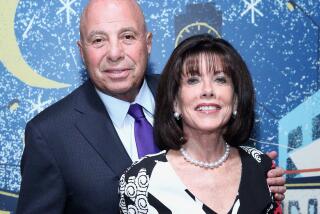Gil Schwartz, longtime CBS communications executive and author, dies

Gil Schwartz, the former longtime CBS corporate communications maven who moonlighted as a successful humor columnist and author, died Saturday at his home in Santa Monica. He was 68.
The cause of death was a heart attack, according to David Hirshey, who was Schwartz’s longtime editor at HarperCollins.
Schwartz was the head of corporate communications at Westinghouse Corp. when it acquired CBS in 1995. He remained in the role in the combined companies and led the communications efforts for CBS until November 2018, when he departed shortly after the firing of the company’s former chairman Leslie Moonves over allegations of sexual misconduct.
In a statement announcing his death, CBS described Schwartz as “a counselor to senior management, a mentor to future PR executives and a popular presence in every hallway. His diverse and sophisticated repertoire ranged from artful media relations and gifted wordsmithing skills to an insightful and humorous view of the media world he loved.”
Schwartz was a unique figure in the corporate world. While collecting a paycheck for representing one of the country’s highest-profile media companies, he skewered and parodied business bureaucracy and managerial machinations in the columns and books he wrote under the pseudonym Stanley Bing.
While working at Westinghouse in the 1980s, Schwartz started contributing to Esquire magazine’s annual Dubious Achievement Awards section, which mocked the ignominious actions, bad behavior and embarrassing activities of the rich and famous. It led to a regular column on corporate life called the Strategist written under the Bing name, a deliberately bland and meaningless moniker meant to protect his identity from his bosses.
“He had been regaling his friends for years with all of these hilarious inside the belly of the corporate beast anecdotes,” said Hirshey, an editor at Esquire at the time. “Another editor at the magazine, David Blum, suggested that ‘Why don’t you just write a pseudonymous column?’ And Stanley Bing was born.”
In 1994, Schwartz moved Bing to Fortune, the business magazine then owned by Time Inc. His column was re-titled While You Were Out — named after the pink message slips left by receptionists and assistants. It was accompanied by a darkened silhouette of Schwartz’s profile, with a cigar held to his mouth.
“He was at his best writing about CEOs who took themselves too seriously while not taking their beleaguered employees seriously enough,” said Los Angeles Times Executive Editor Norman Pearlstine, who was the top editorial executive at Time Inc. during Schwartz’s tenure.
After the internet stock bubble burst in 2001, Schwartz wrote a Fortune column headlined “Real Jobs for Unreal People” that suggested new occupations for those dislocated by the collapse (“Before: tech sector stockbroker … After: ice salesman, Alaska”). It represented his highly suspect look at exuberantly hyped business trends.
Hirshey said he marveled at seeing Schwartz turn out an entire 800-word column on his laptop computer in the 37 minutes it took for the commuter train from his home in New Rochelle, N.Y., to arrive at Grand Central Terminal and toggle between his two personas.
“Stanley Bing would ride the train into New York and emerge as Gil Schwartz and go to this job as the head of corporate communications at CBS,” Hirshey recalled. “For three or four hours in the morning he would be at CBS headquarters with all of these high level discussions with Moonves and he’d be tense and agitated. Then he would show up at lunch as Stanley Bing and be full of bonhomie. It was really the old Clark Kent routine except he didn’t change clothes in a phone booth, but in a Greek coffee shop.”
Corporate environments were also the prevailing subject of Schwartz’s 10 Stanley Bing books, which included business advice parodies presented with bone-dry authenticity, and novels, including one about sexual harassment in the workplace called “You Look Nice Today.”
The first Bing tome was a paperback called “Crazy Bosses.” “He posited the theory that mental illness is actually a strength in business and government, not a liability,” Hirshey said. “That defined the Stanley Bing ethos.”
Schwartz’s best seller was a send up of the “What Would Jesus Do?” book series called “What Would Machiavelli Do? The Ends Justify the Meanness.” The title released in 2000 applied the theories of the 16th century philosopher to contemporary business problems.
“To live true to the vision of the master, we must be as selfish, narcissistic, manipulative, driven, and creative in getting what we want as we can be, not just in our important business actions, but where it really counts: in our hearts,” Bing wrote.
Schwartz was able to keep his alter ego a secret to his colleagues at Westinghouse, a low-profile industrial conglomerate that operated TV stations and radio stations before it acquired a major broadcasting network. His ruse was so effective, an executive at the company sent him a copy of one of his columns with a note that said, “I thought you’d get a kick out of this.”
Once Schwartz was elevated to oversee communications at CBS, his identity was revealed to the New York Times by a former colleague at Esquire.
Hirshey said Schwartz feared that his career would be ended by the revelation. But CBS executives embraced Schwartz’s side job and enjoyed the wicked wit that came with it. Schwartz even appeared on TV talk shows as Bing, plugging his books and presenting commentary in the same acerbic tone of his writing.
Schwartz’s two worlds met each year at his department’s annual Christmas party held on the 52nd floor of the Eero Saarinen-designed CBS headquarters known as Black Rock in Midtown Manhattan. The event — where pigs in a blanket were the signature hors d’oeuvre — was always packed with Schwartz’s publishing and magazine business pals alongside CBS executives and on-air talent.
As head of corporate communications, Schwartz navigated the network through a number of crises, including the scandal that ended Moonves’ storied career. In December 2017, as the #MeToo movement gathered momentum in the wake of Harvey Weinstein sexual assault allegations, a few senior CBS officials, including Schwartz, became aware of a report of an alleged sexual assault by Moonves decades before. Moonves denied the allegations and CBS hired a law firm, which quickly cleared the mogul of wrongdoing.
For the next several months, Schwartz dutifully downplayed rumors of Moonves’ alleged misbehavior until July 2018, when the New Yorker magazine published investigative reporter Ronan Farrow’s report that brought to light allegations of six women.
For years, Schwartz’s job had been to shield Moonves from bad press. But he recognized that the scandal, and Moonves’ denials, were causing enormous damage to the company. So in late August 2018, Schwartz drafted a letter of resignation for Moonves to sign. Moonves refused and the crisis swelled for another two weeks before he was forced out.
Later that month, amid a high-level corporate house cleaning, Schwartz announced his retirement from CBS.
“I still have a lot of writing to do, in an atmosphere of perhaps some greater serenity,” Schwartz wrote in a Sept. 27, 2018, note to his communications team.
“Gil considered Les as more than a boss. He viewed him as a dear friend and was fiercely protective of him during their 20-year relationship,” Hirshey said. “But when the allegations came out in Farrow’s article, Gil told me he felt terribly betrayed. Their bond was broken. The two did not speak since Gil walked out of Black Rock two years ago. He was genuinely hurt by how their relationship ended.”
Moonves declined to comment. A person familiar with the matter said he has expressed his personal condolences to Schwartz’s family.
Schwartz was born on May 20, 1951, in New York City to Bill and Ruth Schwartz. His skills as a communicator were developed at an early age as his parents encouraged him to articulate when speaking to his younger brother, Michael, who is deaf.
Schwartz grew up in New Rochelle before attending Brandeis University, where he earned his bachelor’s degree in theater arts and English.
Schwartz was a poet, playwright, musician, and stage actor. He performed in an improvisational comedy group called the Proposition, which included original “Saturday Night Live” cast member Jane Curtin. He was also one of the founders of the Next Move, a Boston-based improv troupe.
Along with his brother, Michael, Schwartz is survived by his wife of 14 years, Laura Svienty; his daughter, Nina Pajak; his son, Will Schwartz; his stepson, Kyle Bender; his stepdaughter, Rachel Bender; and two grandchildren, Vivien and Sam.
A memorial service will be held in the fall.
Meg James in Los Angeles contributed to this report.
More to Read
Start your day right
Sign up for Essential California for the L.A. Times biggest news, features and recommendations in your inbox six days a week.
You may occasionally receive promotional content from the Los Angeles Times.







